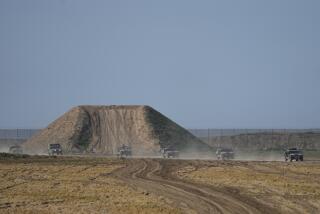Kadafi forces kill 20 in key Libyan city
- Share via
Reporting from Benghazi, Libya and Beirut — A barrage of rocket fire from forces loyal to Libyan leader Moammar Kadafi killed at least 20 people Thursday in the besieged city of Misurata as rebels continued to send boats with humanitarian aid and weapons to try to tip the battle in their favor.
Kadafi’s forces, controlling Misurata’s western and southern edges, launched a ferocious barrage of artillery starting at 6 a.m. Thursday.
“They shelled residential areas and more than 20 people were killed and there were a lot of injuries,” opposition spokesman Mustafa Gheriani said from the rebels’ de facto capital of Benghazi. “They were shelling since the morning.”
The attacks, which targeted the Qasr Ahmed district near Misurata’s port, were apparently intended to halt the arrival of an aid ship. Kadafi’s loyalists recently warned that any attempt to deliver aid to the city, Libya’s third-largest, without the regime’s approval would be met with violence. A captain and an opposition official said at least two boats had been halted outside the port Thursday afternoon after Kadafi loyalists warned by radio they would be attacked if they tried to enter.
Kadafi’s men have also been attempting to use rocket and tank fire to punch a hole in the center of Misurata, which has become a symbol of resistance against the regime. Residents say that Kadafi’s tactic of firing rockets from 10 to 20 miles outside the city had failed to win him any new ground in 40 days, but had cost hundreds of lives.
The North Atlantic Treaty Organization-led international mission to use air power to protect civilians has been of little help in Misurata, residents say.
“We hear their planes after the attack,” said Mohamed Darrat, a businessman turned rebel spokesman. “After the rockets and people die, we hear their planes. They have to either protect us or arm us.”
After the attack Thursday, hundreds of people responded by taking to the streets, some carrying their dead on their shoulders, in a show of defiance against the weeks-long siege and of anger with the international community for failing to halt the attacks.
“They are asking NATO, ‘What are you doing?’” Darrat said in an interview. “Now you’re supposed to be protecting the civilians. And every day they are dying.”
At the docks in Benghazi, ships were being loaded with guns and humanitarian supplies for Misurata. Rockets had pounded the neighborhood around Misurata’s port, killing a large number of people on line for bread, according to ship captain Imad Karra, a native of the city.
“I don’t care. I’m ready to die,” Karra said as he prepared his ship to head out that night. His brother had been killed in Misurata 15 days earlier.
The Benghazi port buzzed as dockhands loaded some boats headed for Misurata with rockets and bullets from Kadafi’s old warehouses. Crates of ammunition were clearly marked in English as the property of Qatar’s armed forces. The gas-rich emirate has been a major champion of the Libyan uprising that began in February.
Meanwhile, Libyan state television reported another round of NATO airstrikes on the Libyan capital, Tripoli, as well as on Aziziyah and Kaklah to the south. State television showed a man purported to be Kadafi standing up through the sunroof of an SUV driving through downtown Tripoli and waving his arms in the air.
International talks over the potentially destabilizing conflict between Kadafi’s forces and rebels determined to end his four-decade rule continued.
Arab League chief Amr Moussa called for a cease-fire as a way “to put an end to bloodshed” and ensure the territorial integrity of the oil-rich North African state.
“The cease-fire is required in order to stop bloodletting, especially after the big number of victims, the injured, the missing, the displaced ... and the besieged people,” he told reporters following an international conference on resolving the Libya crisis in Cairo.
Moussa endorsed the goals of the rebels, including freedom of expression and democracy, but declined to call for Kadafi’s removal, which rebels have insisted on.
Kadafi, for his part, has repeatedly promised to abide by a cease-fire even as he continues to violate it. His forces have hammered away repeatedly at Misurata as well as the rebel-held Western Mountains area, which includes the cities of Zintan and Nalut.
.”
Parker reported from Benghazi, Libya and Daragahi from Beirut, Lebanon.
Times staff writers Paul Richter and David S. Cloud in Washington contributed to this report.
More to Read
Sign up for Essential California
The most important California stories and recommendations in your inbox every morning.
You may occasionally receive promotional content from the Los Angeles Times.










